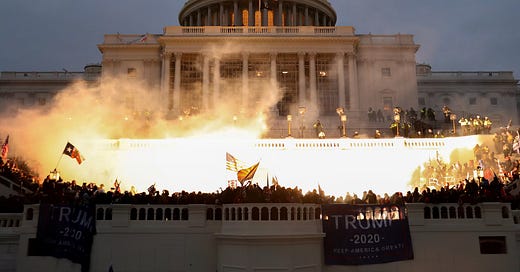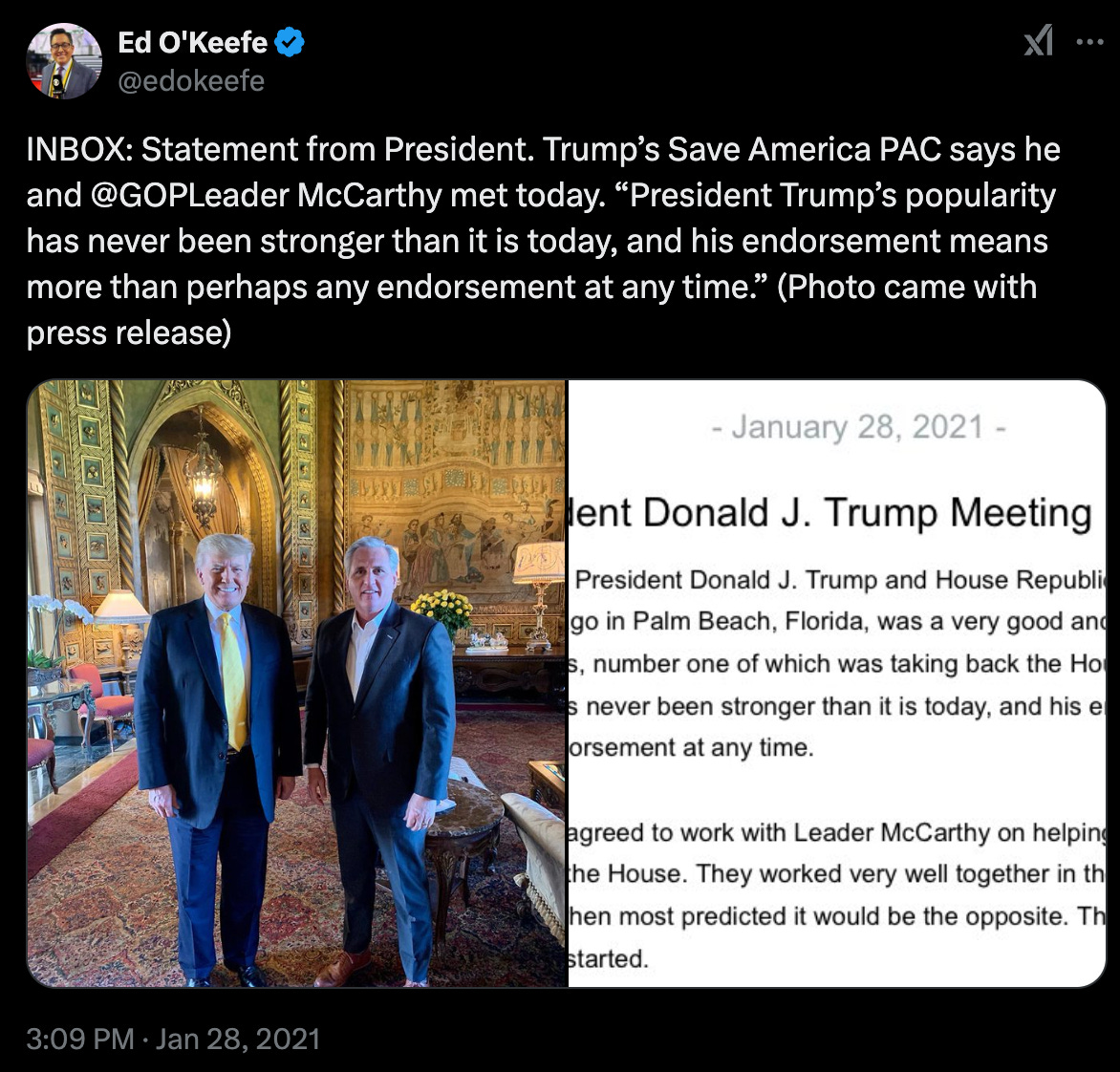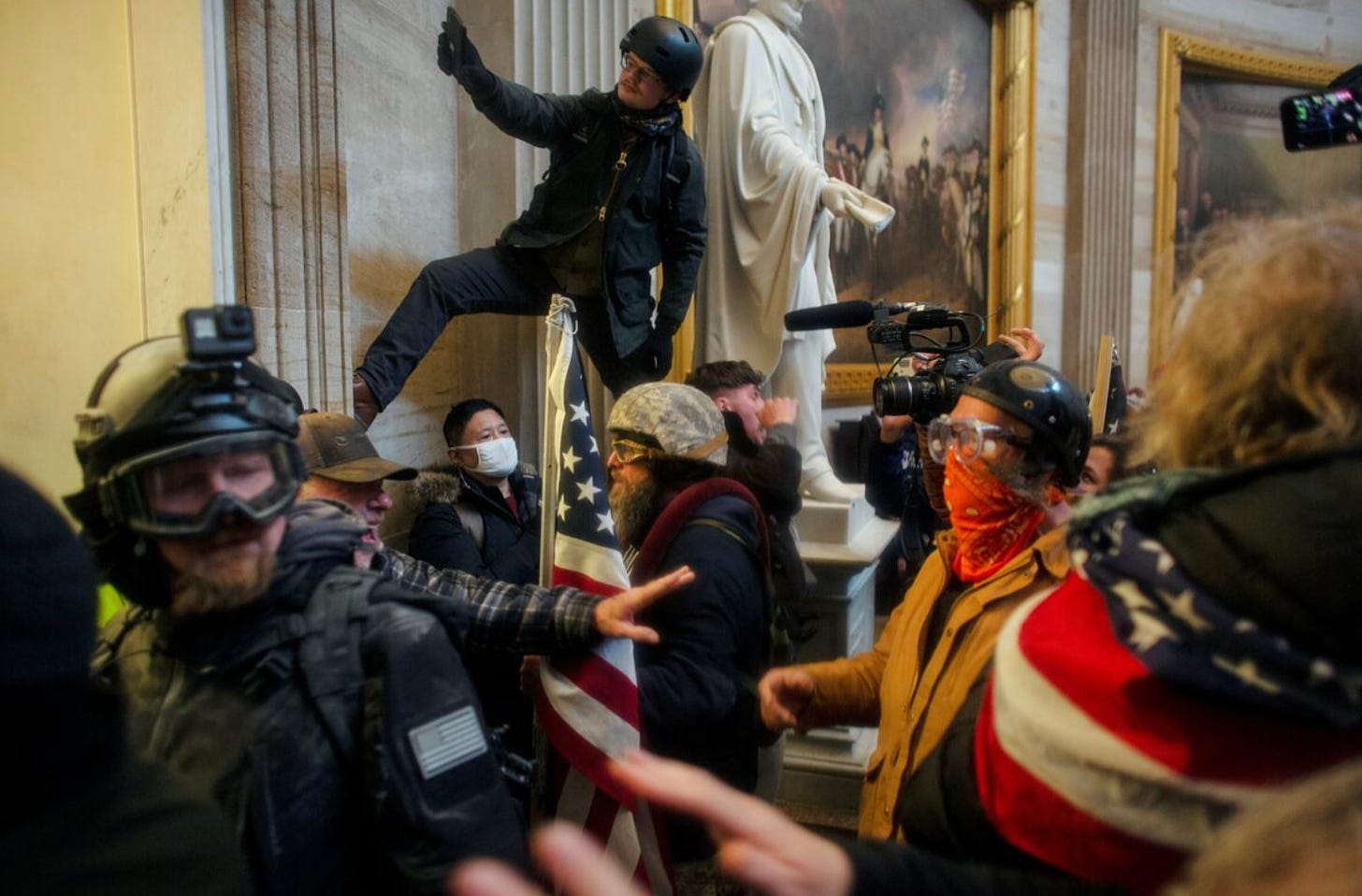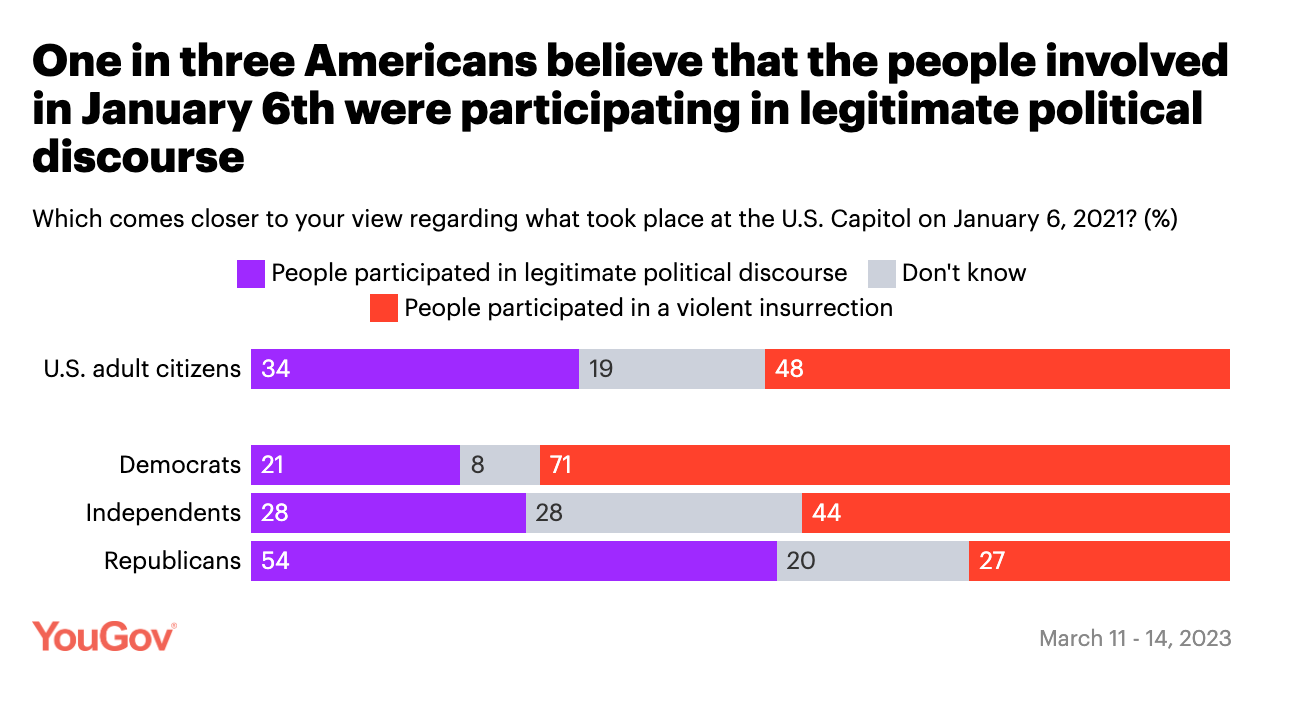Jan. 6 and the path not taken
At key moments, Republicans were unwilling to defend democracy
Four years ago we lived through a pivot point. History could have gone one way, but went another.
For about a one-month period after the Jan. 6 everyone seemed truly appalled. At that moment, America was poised to consign Trumpism to the dustbin of history. Instead, Trump will return to the White House.
If Trump’s first impeachment revealed the deep corruption in his mode of governing, the second impeachment revealed the weakness and complacency of American democratic institutions.
After Jan. 6, much of civil society, the media, and Trump’s own party rejected the unprecedented effort by a mob to interfere with the certification of the election. Trump was judged responsible for encouraging this mob, both on the day itself and for months before, with a series of lies about American democracy. Many in the Trump administration resigned, including Cabinet officials. Corporations said they would no longer fund Republicans who voted to overturn the election. Trump was kicked off social media. He seemed to be heading to a status of a political pariah.
I will never understand how Jan. 6 was not the end of Trump. So, what happened?
How we got here
The blame largely lies with Republican political leaders. Mitch McConnell punted on ending the career of a guy he detests. Kevin McCarthy decided to resurrect Trump out of pure self-interest. John Roberts and other Republicans on the Supreme Court extended a measure of retroactive legitimacy for Trump’s actions leading up to Jan. 6.
McConnell laid the blame for Jan. 6 squarely at the feet of Trump. In private, he said things like: “If this isn’t impeachable, I don’t know what is” and indicated he expected bipartisan support for a vote to convict Trump. In the Senate, McConnell publicly excoriated Trump:
There is no question that President Trump is practically and morally responsible for provoking the events of that day…The leader of the free world cannot spend weeks thundering that shadowy forces are stealing our country and then feign surprise when people believe him and do reckless things.
And yet…McConnell refused to vote to convict. Seven of his colleagues did, and with McConnell’s leadership, more would have done so, potentially enough to get to the supermajority needed. With conviction, the Senate could have also taken the vote to block Trump from running again. Doing so would have ended Trump as a political power. McConnell was clearly considering this option. In an oral history interview at the time the House was impeaching Trump, McConnell said
But apparently you can impeach somebody after they leave office, and if that happens, there’s a second vote in the Senate, which only has to pass by a simple majority, that prevents that person from seeking office again. So he could not only be impeached, but also eliminated from the possibility of a comeback for this office. So it is significant.
In the end, McConnell protected Trump from punishment. It was not just the refusal to vote to convict. After a swift House impeachment, he pushed to delay the Senate trial. He opposed the Senate joining in a Congressional investigation of Jan 6. He endorsed Trump in 2024, although this matters little except to further diminish McConnell’s dignity, as it was clear by this point that the Republican Party was Trump’s and McConnell’s time of influence was at an end.
McConnell saw Trump with complete clarity but suggested he was someone else’s problem: “We have a criminal justice system in this country. We have civil litigation. And former Presidents are not immune from being held accountable by either one.”
Well, about that. Four years on, the criminal justice system failed to hold Trump accountable. In 2024, the Supreme Court kicked the legs out of legal investigations of Trump’s actions by saying that, in fact, Trump was immune in his efforts to use the Justice Department and his Vice President to overturn the election. Put alongside SCOTUS’s reversal of a state court decision declaring that Trump’s role in the insurrection disqualified him from office by violating the 14th Amendment, and it is hard to conclude that the Republican majority would ever block Trump’s return.1
Kevin McCarthy deserves an equal share of blame and perhaps a greater share of opprobrium. McCarthy led the majority of House Republicans who voted to oppose the 2020 election results. You might say this was a symbolic act, which was not going to alter the outcome. But what exactly did the act symbolize? Coming just hours after the ransacking of the chambers by those seeking exactly the outcome that McCarthy endorsed with his vote, most Republicans made clear they stood with the rioters, and not with democracy.
Immediately after the attack on the Capitol, McCarthy told Republicans he would push Trump to resign: “I’ve had it with this guy.” But he saw his goal of becoming House Speaker could be enhanced by supporting Trump. The pro-MAGA core of party would follow Trump no matter what, and there was no meaningful opposition. From a purely political calculus, McCarthy was right. Of the ten Republicans who voted to impeach Trump, only two remain in office, while those who voted to overturn the election have faced no lasting punishment. Trump’s most outspoken Republican critic, Liz Cheney, lost a leadership position in her party. Trump has repeatedly threatened her to prosecute her, while her own party has censured her and recommended that she be investigated.
McCarthy visited Trump in late January, before the Senate vote. His justifications for the visit border on the comical. Cheney recounts the following exchange:
Cheney: Mar-a-Lago? What the hell, Kevin?
McCarthy: They’re really worried. Trump’s not eating, so they asked me to come see him.
Cheney: What? You went to Mar-a-Lago because Trump’s not eating?
McCarthy: Yeah, he’s really depressed.
Trump managed to quickly recover to promote McCarthy’s mercy mission as proof that his “popularity has never been stronger.”
For McConnell, blocking Joe Biden’s agenda, not Trump’s resurrection, was the battle where he devoted his considerable legislative acumen. McCarthy saw his prospects of power as tied to Trump, and made a calculation to go along with him. We will never know the degree to which fear of the mob played a role in shaping their choices, but by enabling Trump, they handed control of their party back to the insurrectionist faction.
McCarthy served as Speaker for a grand total of nine months in 2023, pushed out by the MAGA wing of the party. He is now on a rehabilitation tour, where he is mostly treated as a normal politician, rather than a venal enabler. So it was refreshing to watch Sarah Longwell call out McCarthy to his face.
Where we are now
Four years on, Trump is not a disgraced footnote in American history, but about to retake the Presidency. The long-term effects of his second term cannot be fully known at this point, but if we are to take him at his word, it will embed a series of anti-democratic practices.
The distance between the aftermath of Jan. 6 and today could not be more vast. Then, Trump was pushed off social media. Now, Trump has his own social media. Elon Musk has turned X into a pro-Trump site and is part of the Trump administration. Mark Zuckerberg visits Mar-A-Lago and listens to the national anthem being sung by the January 6th Prison Choir which is, yes, a choir made up of people accused of crimes related to the riot. Trump lent his voice to a fundraising recording for the choir. The song has been a staple of Trump’s rallies, along with his invocation of the attackers as “patriots.” This was a reversion to form: immediately after the attack, he spoke sympathetically of the attackers. Chastened by near-universal condemnation, he quickly called the attack “heinous”. As Trump would go on to rewrite history, many of those who previously denounced him stayed silent.
Adam Kinzinger, another Republican whose political career ended after he served on the House Jan. 6 committee put it this way:
For four years, a massive machine of deception has worked tirelessly to transform the greatest political tragedy of our time — the bloody January 6 attack on the U.S. Capitol — into what Donald Trump now calls a "day of love." As the machine's chief operator, Trump is determined to make the truth the ultimate casualty of that tragedy. It is up to us to defend it.
Corporate promises to stop donations to Republicans who voted to overturn the election have been forgotten. Billionaire donors who labeled Trump a “disgrace” and apologized for supporting him on Jan. 7 were holding fundraisers for him in 2024. Trump has raised $200 million for his inauguration, much of it from corporations who have given up on the idea that they have any responsibility to protect democracy.
It would be one thing if Jan. 6 was simply downplayed, forgotten or whitewashed from our history. That is not what has happened. It has become a central feature in a redemption narrative, offered as a symbol of how Trump’s supporters are victims. Trump has called those who were convicted of breaking the law “hostages”. He has made pardoning them a theme of his re-election campaign. Release the attackers, says Trump, and imprison anyone who exposed his misdeeds while serving on the Jan. 6 committee
The further we have moved from the Jan. 6, the easier it has been to rewrite history, to tell people to ignore what they saw with their own eyes. All the same, the transformation occurred with shocking speed. The “lost cause” narrative of the post-civil war South took a generation to take hold. A similar turnaround in venerating traitors occurred in just a couple of years, a testimony to how quickly they were embraced by right-wing politicians and media. Emblematic of this process is that Kevin McCarthy, who refused to co-operate with the Jan. 6 House investigation, handed over thousands of hours of video to aid Tucker Carlson’s efforts to rehabilitate the attackers.
Carlson claimed that “these were not insurrectionists. They were sightseers.” He also advanced the claim that the attack was a “false flag” organized by the government, a claim promoted by Republicans like Marjorie Taylor Greene, who will now oversee government reform as chair of the new DOGE sub-committee, Trump’s nominee for Attorney General, Matt Gaetz, and Kash Patel, Trump’s nominee to lead the FBI.
Now, most Republicans describe those involved in Jan 6 as engaged in “legitimate political discourse”. One in four now approve of the mob that invaded the Capitol, up from 1 in 10 immediately after the attack.
Support for Jan. 6 was disqualifying; now its a crucial signifier of loyalty to Trump. In a panicked call where McCarthy asked Trump to call off his followers, Trump retorted: “Well, Kevin, I guess these people are more upset about the election than you are.” The idea that the attackers of the Capitol were the true Trump loyalists has returned. Donald Trump Jr. described the screening process for a new Trump administration: “Loyalty has got to be number one,” emphasizing that the Presidential Personnel Office “will diligently go through and understand not just where were they in 2015 and 2016, but where were they on January 7th”. Candidates were asked to indicate their support for Jan. 6:
The questions went further than just affirming allegiance to the incoming administration. The interviewers asked which candidate the applicants had supported in the three most recent elections, what they thought about the events of Jan. 6, 2021, and whether they believed the 2020 election was stolen. The sense they got was that there was only one right answer to each question.
As Trump fills American government with people who supported, or are happy to lie about, an assault on democracy, we have to remember that it didn’t have to be this way. South Korea and Brazil are recent examples where politicians and judges did their jobs, removing from power the leaders who aped Trump’s anti-democratic practices. In both countries, those leaders followed Trump’s script, falsely claiming that election outcomes were rigged. Bolsonaro, advised by Trump’s political aides, had his own Jan 6-style uprising. Yoon has also pointed to the U.S. Supreme Court’s immunity decision to justify his refusal to surrender to authorities. In both countries, those who attacked democracy have been held to account. In the US, they will retake office, stronger and more emboldened than ever.
There was nothing inevitable about where we are today. In key moments key Republicans said, essentially, that Jan. 6 was not a big deal, or even a positive event. It is hard not to conclude that the people who occupy key institutions in newer democracies were simply less willing to take those democracies for granted. By contrast, American democracy seems to be of such little value to many of its leaders that they did nothing to defend it.
While the Colorado decision was unanimous, a 5-4 conservative majority argued for such strict limitations on the 14th Amendment as to effectively make it impossible for a Trump-like figure to be affected.








Thank you Don. At the time I phoned the 147 Representatives twice up to Jan 5. Their staff all had the same response that there might be but it couldn’t be said what would have to happen for them to say then President-Elect was rightfully elected. They were in cahoots only at that time people refused to admit it. I have big thanks Anne Applebaum shared your post. Appreciate your thoroughness. Happy New Year